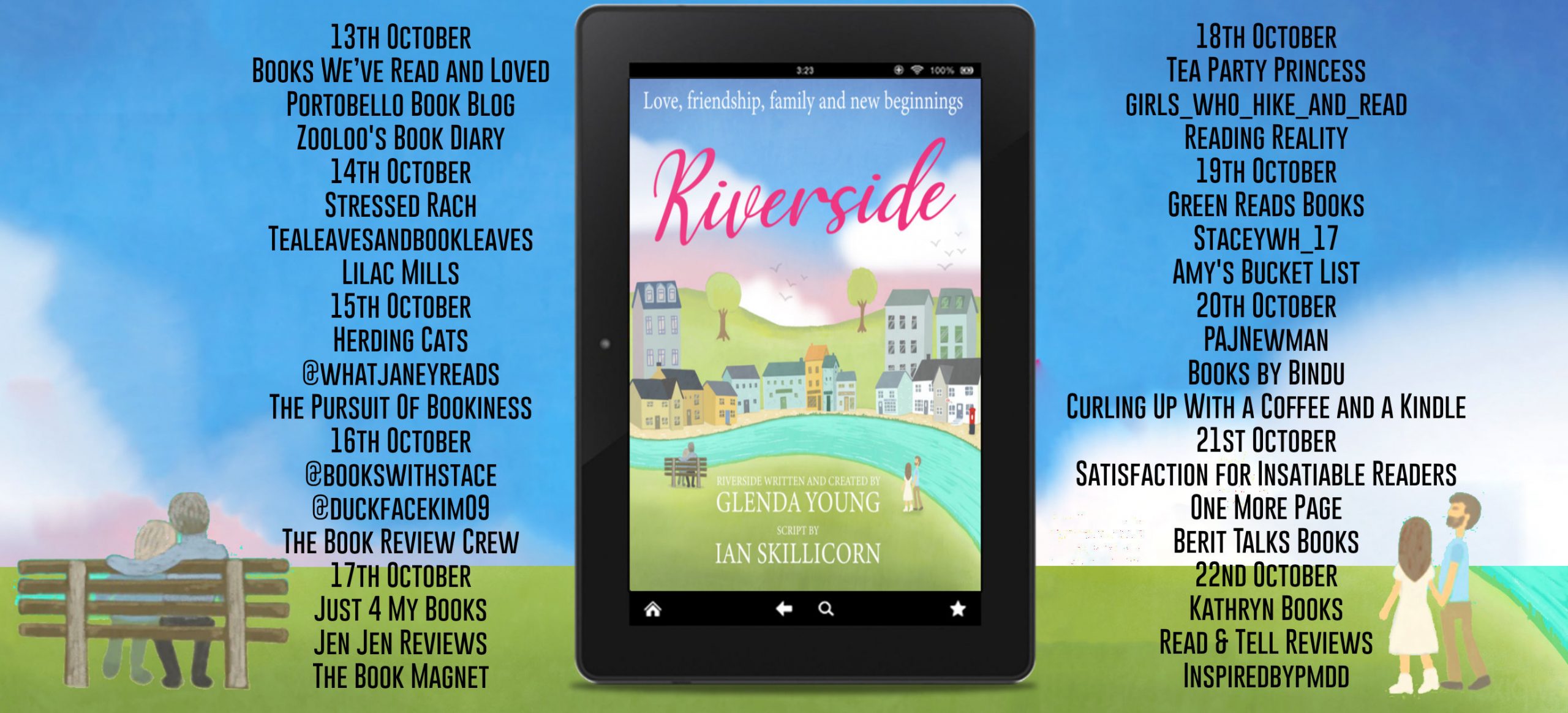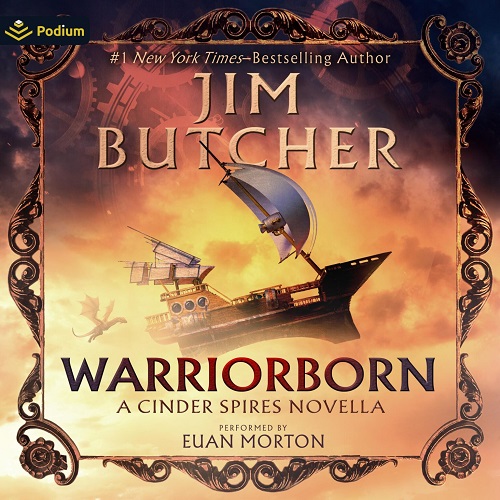 Warriorborn: A Cinder Spires Novella (The Cinder Spires) by Jim Butcher
Warriorborn: A Cinder Spires Novella (The Cinder Spires) by Jim Butcher Narrator: Euan Morton
Format: audiobook, ebook
Source: purchased from Amazon, purchased from Audible
Formats available: paperback, ebook, audiobook
Genres: fantasy, gaslamp, steampunk
Series: Cinder Spires #1.5
Pages: 146
Length: 3 hours and 1 minute
Published by Podium Audio on September 5, 2023
Purchasing Info: Author's Website, Publisher's Website, Amazon, Barnes & Noble, Bookshop.org, Better World Books
Goodreads
Benedict Sorellin-Lancaster hasn’t even broken in his lieutenant’s insignia when he’s summoned to meet with the Spirearch of Spire Albion himself for a very special—and very secret—purpose. The Spirearch needs Benedict to retrieve a bag he’s “misplaced” on the Colony Spire known as Dependence, which has strangely cut off all contact with the outside world. It’s a delicate mission at best, a potential bloodbath at worst.
To this end, the Spirearch has supplied Benedict with backup in the form of three Warriorborn. But unlike the courageous lieutenant, this trio has formerly used its special gifts for crime, carnage, and outright bloody murder. And all of them were caught and imprisoned because of Benedict. Now, if they behave—and make it back alive—they’ll go free.
But when the odd squad reaches Dependence, they soon discover something waiting for a horrific weapon that could shatter the balance of power among the Spires. And Benedict will have to bring his own Warriorborn skills to bear if he, his team, and Spire Albion are to have any hope of survival . . .
My Review:
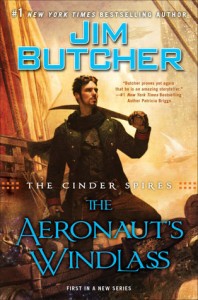 Warriorborn is the perfect method for readers who remember the first book in the Cinder Spires, The Aeronaut’s Windlass, fondly but may not remember the details of its vast array of political shenanigans all that clearly to get back into this series.
Warriorborn is the perfect method for readers who remember the first book in the Cinder Spires, The Aeronaut’s Windlass, fondly but may not remember the details of its vast array of political shenanigans all that clearly to get back into this series.
It’s perfect, not just because it’s much, much shorter than that first book, but mostly because it glosses over those major political shenanigans – although I’m sure they’ll be back in The Olympian Affair – in order to tell a sharp, compelling story about a military/espionage mission that goes FUBAR in every possible way that it can.
And keeps the reader on the edge of their seat for the entire wild ride.
Our hero in Warriorborn is one of the many point-of-view characters from Windlass, but the way that this story is told it doesn’t matter whether you remember that much or at all. I kind of vaguely did, but not in any detail. It doesn’t even matter if you know or remember the start of the current conflict between our protagonists from Albion and their enemies from Aurora.
This story is all about one singular encounter. One of the Spirearch’s (read as king) covert operatives in a far-flung province has communicated that there’s trouble brewing – but with no details. Guard Lieutenant Benedict Sorellin-Lancaster is being sent from the capital to said remote province to investigate the situation, not with a squad of his fellow guards but rather with a group of convicted criminals who have been promised a commutation of their sentences and a pardon for the rest if they get him there and back again in one piece WITH the information they’ve been sent to retrieve.
Benedict doesn’t expect the job to be easy. Neither he nor the reader are exactly surprised to discover enemy agents have infiltrated the tiny provincial town. But he doesn’t expect the acid slime monsters who have literally eaten all the townsfolk, the dragon parked on the only way out of town, or the tribe of sentient cats who save Benedict’s mission and his own clawed up ass – even as he saves theirs.
Just barely and with a whole lot of luck – all the way around. Even though most of that luck was worse than Benedict ever imagined.
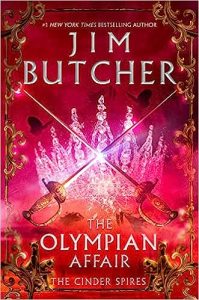 Escape Rating A-: I picked this up this week because I was having a “flail and bail” kind of day. Post Halloween, I was horror’ed out. Even at the horror-adjacency level I’m more comfortable in. I hit the “I can’t evens” and went looking for something a bit more comforting. This would not, I admit, normally have filled that bill, but the NetGalley app was having a flail of its own which is now fixed, but at the time was knocking me out of the book I’m listening to.
Escape Rating A-: I picked this up this week because I was having a “flail and bail” kind of day. Post Halloween, I was horror’ed out. Even at the horror-adjacency level I’m more comfortable in. I hit the “I can’t evens” and went looking for something a bit more comforting. This would not, I admit, normally have filled that bill, but the NetGalley app was having a flail of its own which is now fixed, but at the time was knocking me out of the book I’m listening to.
I had picked up Warriorborn in both text and audio for a couple of reasons. That it was short is the reason it’s being reviewed here and now, but the main reason was the upcoming publication of the second book in the author’s Cinder Spires series, The Olympian Affair. It’s been EIGHT whole years since the first book in the series, The Aeronaut’s Windlass, came out. That’s a long time in book years, and I was wondering more than a bit whether I’d remember enough of how this world is put together to be able to get stuck back in this series.
As Warriorborn is both rather short and takes place after The Aeronaut’s Windlass but before The Olympian Affair, it seemed like a good book to solve all three problems; both NetGalley and my own flailing, and that niggling question about whether I could jump back into the series without at least a serious skim of that once upon a time series opener.
There’s a bit in Warriorborn where Benedict tells the story of an uncle of his who claimed that “if you have one problem, you have a problem. If you have two problems, you might have a solution. And if you can’t craft a solution out of that, what are you even doing?”
I fell right back into this world. We get just the tiniest hint about Benedict’s role in the first book, just enough info to understand why the Spirearch trusts him with this mission, wrapped in a whole bunch of bantering misdirection between himself and his king. It’s a setup, he knows it’s a setup, the Spirearch knows it’s a setup, but everything has to seem above board until the ship lifts and Benedict and his crew are out of reach of meddling politicians.
The true story in Warriorborn is about the mission itself, and that is utterly FUBAR from the outset and EVERYONE knows it. We see just enough of Benedict’s internal perspective to be aware that as calm as he appears on the surface, he’s paddling as fast as he can under the roiling waters.
Which are roiling pretty damn hard as the whole thing becomes a series of out of the frying pan into the fire maneuvers that just keeping getting worse and worse as the mission goes to hell, his crew mostly falls apart and his own chances of survival get smaller with each passing moments.
At which point, just as in The Aeronaut’s Windlass, the mission is saved by sentient cats. I’d be tempted to read the whole damn series – possibly more than once – for more of Rowl of the Nine Claws, the one character I truly remember from the first book and hope to see more of in the second, and Saza and Fenli and the entire clan of Swift Slayers in this one.
One final note, one that is in danger of making this review longer than the actual book. I did have this both in audio and in text. I switched back and forth from one to the other as my circumstances shifted over the course of the day, and I enjoyed it both ways. The text moves compellingly, from one near-disaster to another, while the audio narrator, Euan Morton, did an excellent job of differentiating between a cast of several different characters and personalities to the point where I ended up playing solitaire for an hour just so I could finish the book listening to his narration.
A good reading – and listening – time was absolutely had by this reader no matter which way I absorbed this story!

 Into the Riverlands (The Singing Hills Cycle, #3) by
Into the Riverlands (The Singing Hills Cycle, #3) by 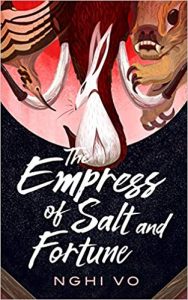 The entire
The entire 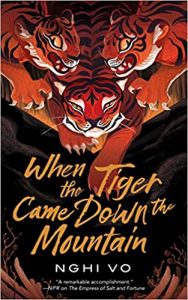 Escape Rating A+: At first, Into the Riverlands seems as if it’s a play on the Canterbury Tales, with Cleric Chih taking the place of Geoffrey Chaucer himself (who, come to think of it, by certain definitions was himself a ‘cleric’). Into the Riverlands is a journey, and every person in the party has at least one story to tell. It’s Chih’s duty to record those stories – not to become a part of one themselves.
Escape Rating A+: At first, Into the Riverlands seems as if it’s a play on the Canterbury Tales, with Cleric Chih taking the place of Geoffrey Chaucer himself (who, come to think of it, by certain definitions was himself a ‘cleric’). Into the Riverlands is a journey, and every person in the party has at least one story to tell. It’s Chih’s duty to record those stories – not to become a part of one themselves.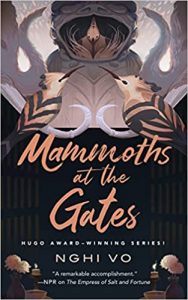 But, as I said in last week’s review of
But, as I said in last week’s review of 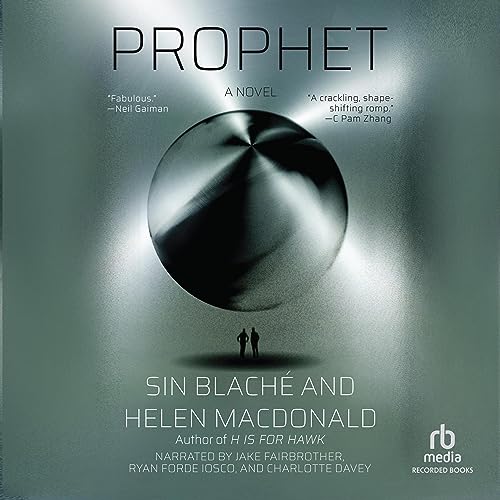 Prophet by
Prophet by 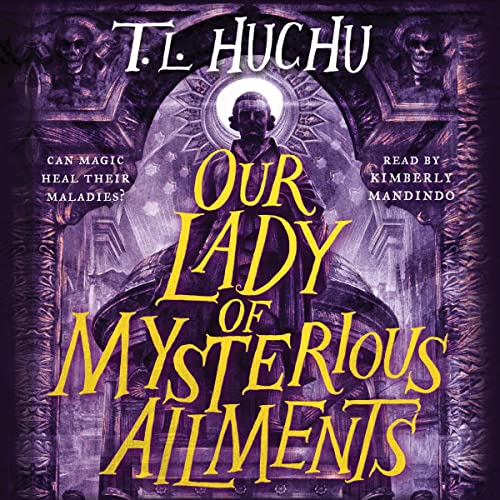 Our Lady of Mysterious Ailments by
Our Lady of Mysterious Ailments by  Escape Rating A+: Our Lady of Mysterious Ailments is just like
Escape Rating A+: Our Lady of Mysterious Ailments is just like  Junkyard War (Shining Smith #3) by
Junkyard War (Shining Smith #3) by  But Shining is not the only human queen, because every true hero – especially if that’s not remotely what they want to be – creates their own archenemy – or the other way around. Clarisse Warhammer targeted Shining all the way back in
But Shining is not the only human queen, because every true hero – especially if that’s not remotely what they want to be – creates their own archenemy – or the other way around. Clarisse Warhammer targeted Shining all the way back in 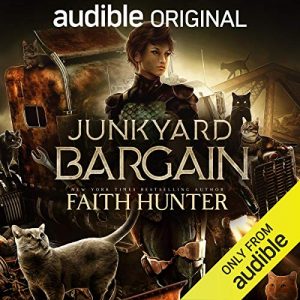 Which means two things. First, the books pile layer upon layer building Shining’s world, so you really need to start at the beginning in
Which means two things. First, the books pile layer upon layer building Shining’s world, so you really need to start at the beginning in 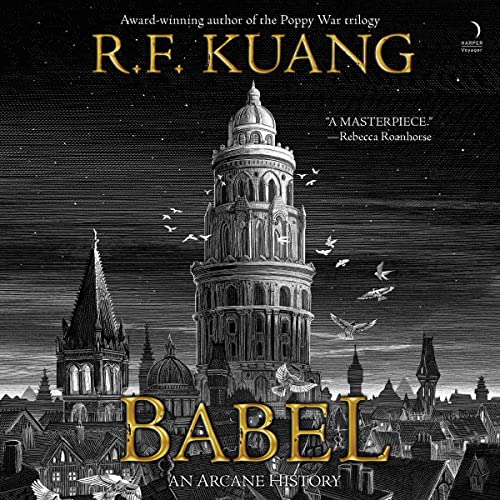 Babel, Or the Necessity of Violence: An Arcane History of the Oxford Translators' Revolution by
Babel, Or the Necessity of Violence: An Arcane History of the Oxford Translators' Revolution by 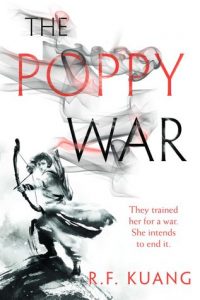 In a work of historical fantasy, particularly one that cleaved so close to this period, those evils would be impossible to ignore and no reader should expect them to be ignored. But Babel is fiction, which means I also went into it expecting a story to be told that would captivate me – and in this particular case captivate me every bit as much as the author’s
In a work of historical fantasy, particularly one that cleaved so close to this period, those evils would be impossible to ignore and no reader should expect them to be ignored. But Babel is fiction, which means I also went into it expecting a story to be told that would captivate me – and in this particular case captivate me every bit as much as the author’s 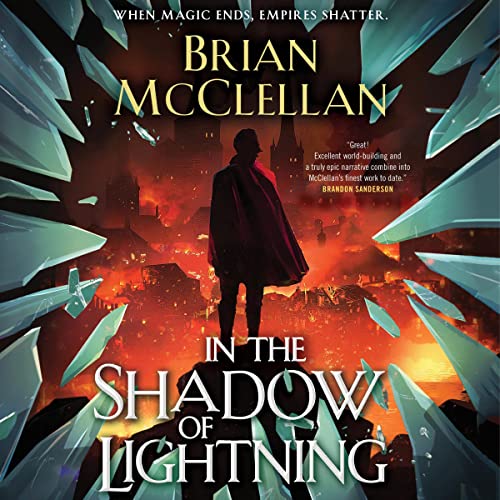 In the Shadow of Lightning (Glass Immortals, #1) by
In the Shadow of Lightning (Glass Immortals, #1) by 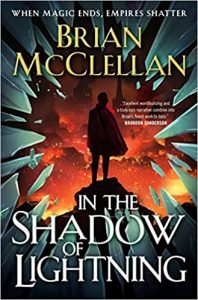 Escape Rating A+: “Glassdamn.” It rolls easily through the mind, or trippingly off the tongue, as though it’s an epithet that we’ve always used – or at least could have if we’d had a mind to. And glassdamnit but this is a terrific story.
Escape Rating A+: “Glassdamn.” It rolls easily through the mind, or trippingly off the tongue, as though it’s an epithet that we’ve always used – or at least could have if we’d had a mind to. And glassdamnit but this is a terrific story.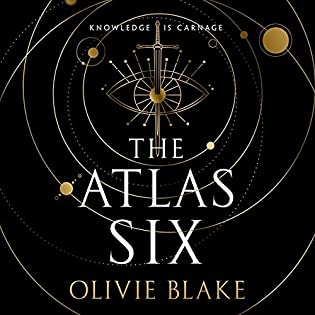 The Atlas Six (The Atlas, #1) by
The Atlas Six (The Atlas, #1) by 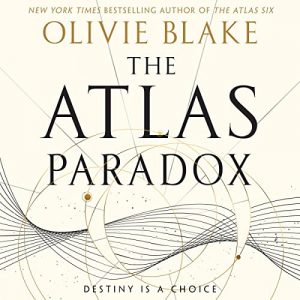 Which admittedly does ramp up the tension VERY dramatically for the second book in the series,
Which admittedly does ramp up the tension VERY dramatically for the second book in the series, 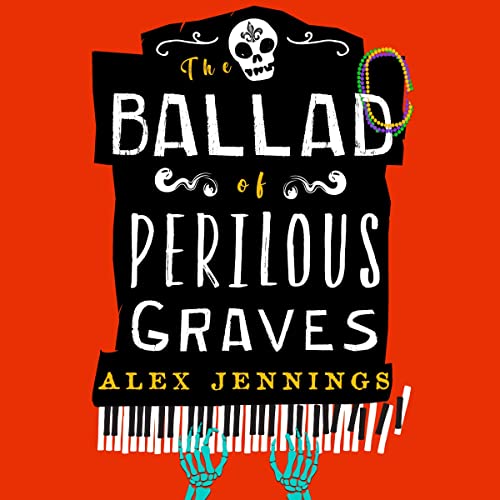 The Ballad of Perilous Graves by
The Ballad of Perilous Graves by 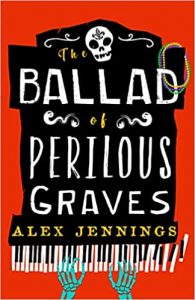 Escape Rating A-: I am a sucker for stories about New Orleans so I was all set to love The Ballad of Perilous Graves. Which in the end I did, although it took awhile to get me there. This is one of those books where the audiobook, as read by Gralen Bryant Banks, carried me over to the point where the story got its hooks into me and didn’t let go.
Escape Rating A-: I am a sucker for stories about New Orleans so I was all set to love The Ballad of Perilous Graves. Which in the end I did, although it took awhile to get me there. This is one of those books where the audiobook, as read by Gralen Bryant Banks, carried me over to the point where the story got its hooks into me and didn’t let go. Riverside: The feel-good, life-affirming story of love, friendship, family and new beginnings by
Riverside: The feel-good, life-affirming story of love, friendship, family and new beginnings by 